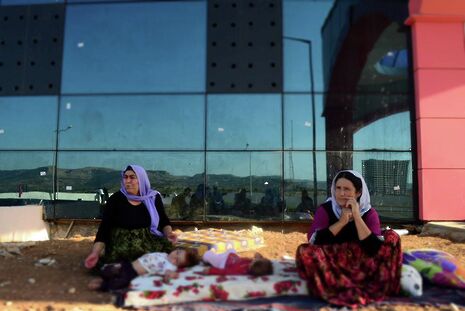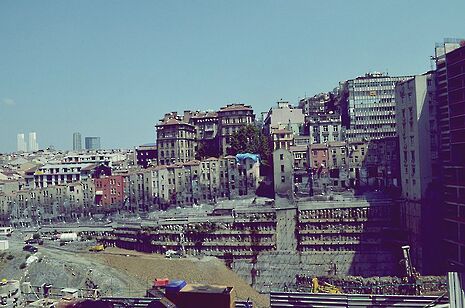Student reporters without borders
Sky Holmes reflects on his summer reporting from Turkey and Kurdistan and the increasing tension in the region

In August, I witnessed Turkey’s first public and directly democratic vote for a head of state in its presidential election, where Recep Tayyip Erdoğan alone was tipped to win, and of course did. Erdoğan established the socially conservative AKP that has transformed Turkey into a police-state, revealed as such in the 2013-2014 protests which, like Kiev’s Maidan and Cairo’s Tahrir, thrust the Square into the media spotlight. As I reported from Taksim Square, the protestors of Gezi and even Marxist-Leninist groups that have employed suicide bombs against the police had no public presence: the sheer numbers of police meant that any action was deemed too risky. That week the police were arresting the police, raiding the homes of officers accused of investigating government corruption, apparently a crime.
In 1850 the novelist Gustave Flaubert predicted that in a century’s time, Istanbul would be the capital of the world. He may not have been far wrong, but I hope he was. Erdoğan is pushing more than $100bn worth of construction projects into the city where he grew up. The new $15 billion airport, planned to be the world’s busiest and to be named after him, is Erdogan’s largest project to attract tourists and impress the EU, as well as destroy one of the last few green areas around Istanbul. But this social engineering, coupled with a haven of new urban architectures associated with liberal, democratic Western powers, proceeds while the south of Turkey and Kurdistan is arguably crippled by poverty. I have witnessed residents being forced from their homes, destroyed to make way for shopping malls, and Syrian refugees cover Taksim Square while armoured vehicles prowl. A dominant, illiberal anti-Arabism is part of this social engineering; a hatred of Syrians is found among many Turks and resentment of the Kurdish people is encouraged by the state.

Moving south in my travels, avoiding the Islamic State, I reached the Syrian border, a largely pro-Kurdish area. Near Mardin and border cities split in two by the line that separates southern Turkey/Kurdistan with Syria, Yazidis from the Sinjar region described being trapped on Sinjar Mountain and later being rescued by the armed PKK (Kurdish Worker’s Party).
I spoke for four or five hours to Yazidi men my age who defended their villages against IS before running out of ammunition. Though one village repelled the IS attack, IS regrouped with Arabs from neighbouring areas and returned to finish what they had started. Yazidis have always occupied a volatile position in their home territory of Iraq. A twenty-one-year old maths teacher called Rambosy managed to escape his village, whilst being heavily fired on by IS after using his family’s AK-47 to defend his home. Many of his friends and family were lost that day, killed or perhaps kidnapped. Kurdish Peshmerga forces, the villages’ protection against IS, fled as the black flags came closer into sight. Many of the Yazidis believe they owe their lives to the PKK, who came in cars to support them when no-one else offered them anything.
“I’ll go back and fight,” I am told repeatedly in the refugee camps. A father called Khalid told me that “If our families are looked after by Europe, we will fight IS.” Many I speak with want their families out of the Middle-East. They are fed up with the danger and view Europe as a safe refuge. But Turkey is tearing at the seams, holding some 847,000 Syrian refugees and many Yazidis. Many refugees I speak with express concerns of “being sent over to Syria to die”, or transported “back to Iraq”, an even worse fate. But Europe’s borders appear to be closed. In response to the largest forced displacement crisis in the world, only a short journey away, Europeans have provided refuge to around 4 per cent of all Syrian asylum seekers. Europe’s rhetoric of aid does not match its actions; we must offer more and better legal ways of coming to Europe as opposed to the sinking ships many Syrians rely on. Whether through family reunification schemes, more reception centres, fewer detention centres, student and work visas, or private sponsorship, Europe must do more.
Turkey is being crippled from the inside out, seemingly left alone by most of Europe to deal with the refugees spilling into its borders. Protests are rife. IS operates in Istanbul, and Kurds are becoming increasingly discontent with the AKP. The PKK have more power than ever before, with international media largely ignoring their EU-given status as a ‘terror organisation’ while they battle IS. I speak with a woman whose young PKK cousin was killed by IS. Next year she and her children will join the armed struggle. The Kurdish-Turkish conflict was seemingly coming to an end, but I meet men imprisoned for throwing stones at the police whose children are now picking up assault rifles, and my meeting with the PKK in the mountains suggests the conflict may reignite. Tension is rising. With the peace process between the AKP and PKK crumbling, and recent Turkish attacks on Kurds fleeing into Turkey to escape IS, Turkey may face an armed conflict within its borders which will have repercussions for Europe and the Middle-East.
As I have come to realise, Turkey, with embedded Kurdistan and borders with Syria and Iraq, must not be viewed as the cultural stereotype of an intricate mosaic but, currently, a shattered mosaic undergoing further deconstruction. Turkey’s future will arguably be born from its fragments, and from what I saw this summer, I believe that the PKK is the important shard that needs to be placed back inside the main frame.
Sky Holmes is the founder of the independent reporting project haveface.org.
 Features / Should I stay or should I go? Cambridge students and alumni reflect on how their memories stay with them15 December 2025
Features / Should I stay or should I go? Cambridge students and alumni reflect on how their memories stay with them15 December 2025 News / SU reluctantly registers controversial women’s soc18 December 2025
News / SU reluctantly registers controversial women’s soc18 December 2025 News / Dons warn PM about Vet School closure16 December 2025
News / Dons warn PM about Vet School closure16 December 2025 News / Cambridge study finds students learn better with notes than AI13 December 2025
News / Cambridge study finds students learn better with notes than AI13 December 2025 Arts / A beginner’s guide to Ancient Greek tragedy16 December 2025
Arts / A beginner’s guide to Ancient Greek tragedy16 December 2025








